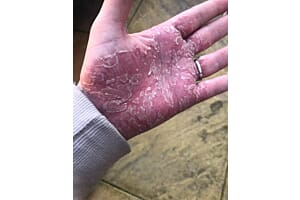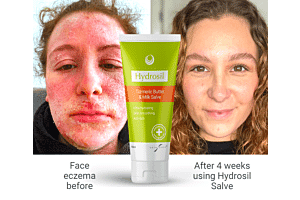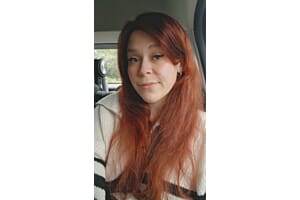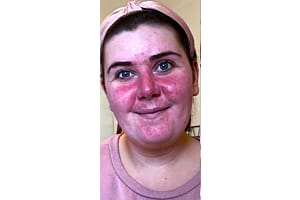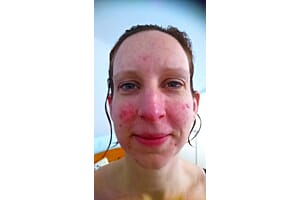If you have spots, you tend to assume you have acne. But this is not always the case, in fact a lot of ‘spots’ are caused by other factors, including skin allergies, independent health conditions, infections or viruses.
However if you use anti-acne treatments on many of these other ‘acne’ conditions, it can make the condition far worse.
Here are 10 causes of acne that you may not know about;
- Acne
Normal acne is caused by a blockage of the sebaceous glands on the surface of the skin. Many things can cause this blockage.
However the main cause of typical acne experienced by 90% of teenagers is that hormonal changes, (namely the surge of testosterone that occurs in both teenage girls and boys) can cause the skin to harden slightly and block the sebum gland causing a pimple to form.
How to know if you have normal acne;
- You are a teenager and suddenly get spots
- Your get better with frequent use of anti-bacterial washes, acne creams or treatments or with natural alternatives
- You are female and get spots just before your period
- You have spots in particular in the T zone which is between your eyebrows, on your nose and across your cheeks
Treatment
Anti bacteria/anti-acne washes, antibiotics , tea tree oil
2. Allergy Acne
Skin allergies to external irritants can also cause spots, but are not actually acne. Skin allergies to skin creams, beauty products and perfumes are very common and can cause small rash like spots to form of the sides of the face and neck.
[quote]Allergic spots can be repeatedly triggered by an irritant and so appear like normal acne.[/quote]
Another common cause of allergy spots is from shampoo. Normal shampoos contain harsh preservatives and strong perfumes. When people with long hair sleep on their hair after washing it with shampoo, this can cause spots to form on the sides of the face and neck. Simply tying hair back at night and swapping to a non-chemical non-perfumed shampoo can often clear up allergy acne.
How to know if you have allergy acne;
- The spots itch at all
- You suddenly develop spots and you are an adult with usually clear skin
- You have spots mostly on the sides of your face
- You have long hair and sleep with it loose at night
- Your spots get worse of better when you change either skin creams, cosmetics or perfumes
- You have spots just around your neck (this could be allergy spots caused by a reaction to a washing powder on the collar of your clothes)
Treatment
Chemical steroids, plant-steroid ointments, emollients, omega oils
- Acne Rosacea
Rosacea is a skin condition that causes spots, but is not like normal acne. Rosacea is causes by a dilation of the blood vessels just below the skin’s surface.
How to know if you have acne rosacea;
- Your nose and/or cheeks are often red
- The spots are small and pussy and only on your cheeks and nose
- You were over the age of 30 when you started to get the spots (in particular if you are female as women are more prone to this skin condition than men)
- Your facial skin feels bumpy
- Your spots and redness get worse in the heat or the cold, in the sun, after drinking alcohol or eating spicy food or after you use certain skincare products
Treatment
Antibiotics, anti-redness skincare
4. Fungal Acne
Face Fungus (Tinea faciei) can also cause what looks to be small ‘acne like’ spots on the face
How to know if you have facial fungal acne;
- The spots are small and always puss filled with not much inflammation around them
- You have or have had other fungal infections elsewhere on your body in recent months
- The spots gets worse with anti-acne treatments
- The spots itch
- The spots are located mostly on the chin, upper lip and mouth area or among facial hair or stubble
- You have a white coating on your tongue
- You also have dandruff
Treatment
5. Scalp Acne
Scalp dermatitis/eczema can cause small spots to appear around the hair line and on the neck as well as the scalp because the actual dermatitis causes small scabs on the scalp that then block sebum in the hair follicle causing pussy spots.
[quote]Scalp dermatitis/eczema can be hereditary or can be caused by a reaction to shampoo, hair sprays, hair dyes or any other perfumed or chemical hair products. Frequent blow drying at high temperatures can also lead to scalp eczema.[/quote]
How to know if you have scalp dermatitis/eczema acne;
- The spots you have are mostly clustered around the hairline, behind the ears and on the neck
- You have an itchy scalp
- You have spots on your scalp
- You have a flaking scalp
- Your scalp flakes likes dandruff but does not improve with anti-dandruff shampoos
Treatment
6. Herpes Acne
The Herpes Simplex virus lives in eth base of the spin but lies dormant in the skin cells. The most common skin problem caused by the Herpes Simplex virus is cold sores.
[quote]However Herpes sores can appear on the skin and not the lips and cause small fluid and puss filled blisters that resemble acne. If facial herpes appears without cold sores on the lips, the condition is often misdiagnosed as acne by doctors.[/quote]
How to know if you have Herpes acne;
- The spots are only around the mouth area and on the chin
- The spots contain lots of fluid and burst easily, even without squeezing
- The spots are large and quite red
- The spots felt hot and itchy before they could be easily seen
- You have had cold sores in the past
Treatments
Anti-viral skin treatments for cold sores
7. Hives Acne
Hives on face are raised, flat-topped bumps that are smooth to the touch, typically red in colour. They can occur anywhere on your face and neck, including the ears.
[quote]Hives are genetically linked and sufferers get several outbreaks over a long period of time. Facial hives are rarely correctly identified by doctors.[/quote]
How to know if you have hives acne;
- The spots rarely come to a head, but can look red and raised like normal acne before puss appears
- The spots are very itchy
- The spots appeared after sun exposure and the face stayed very red
- You recently took a course of antibiotics
- You were recently bitten by an insect
- You also get hayfever
- You recently had a severe flu, tooth infection or sinus infection
- The face is slightly swollen
Treatment
Specific anti histamines or oral corticosteroids
8. Pustular Psoriasis
Psoriasis is a skin condition that is caused by the over activity of skin cell division and is genetically linked, although certain lifestyle factor scan trigger it or make it worse such as stress, smoking, obesity, depression, physical and emotional trauma, some medications and viruses.
[quote]There are two types of psoriasis, pustular and gutate. Pustular psoriasis on the face can look just like acne. Some people only get psoriasis on their face[/quote]
How to know if you have pustular psoriasis;
- You have red clusters of pussy spots on your cheeks, in between your eyes, near your hairline or on your neck.
- There is some scaly greyish skin around the spot clusters
- Your skin flakes a bit
- Your spots gets worse with anti-acne treatments
- The spot clusters are getting progressively bigger
Treatment
Steroid creams, coal tar treatments, anti-plaque creams & washes
9. Heat Acne
Heat rash is more common than people think and can cause small rashy acne-like spots on the face.
[quote]Heat rash is not only causes by sun and can stay around for several days in come cases, which is why it is sometimes mistaken for acne.[/quote]
How to know if you have heat acne;
- The spots are small and red and there are lots of them
- You have had recent sun exposure
- You have recently done excessive exercise or sweated profusely
- You live or work in a very warm environment
- Your skin feels prickly
Treatment
Calamine lotion, hydrocortisone creams
10. Impetigo Non-Bullous Acne
Impetigo is a contagious, superficial bacterial infection of the skin and is most likely to occur in warm and humid environments and is most commonly spread by close contact (such as family members).
There are two types of impetigo, bullous and non-bullous impetigo, the non-bullous type causes small pussy spots that look similar to acne.
How to know if you have non-bullous impetigo acne;
- The spots start as small red bumps more like insect bites
- Later the spots have puss in then that then turn to a honey coloured scab
- The spots formation continues in one week cycles
- The spots are mainly clustered around the nose and between the nose and lips
- Your lymph glands feel slightly tender
- Other members of your family or people you have been close to have similar symptoms
Treatment



